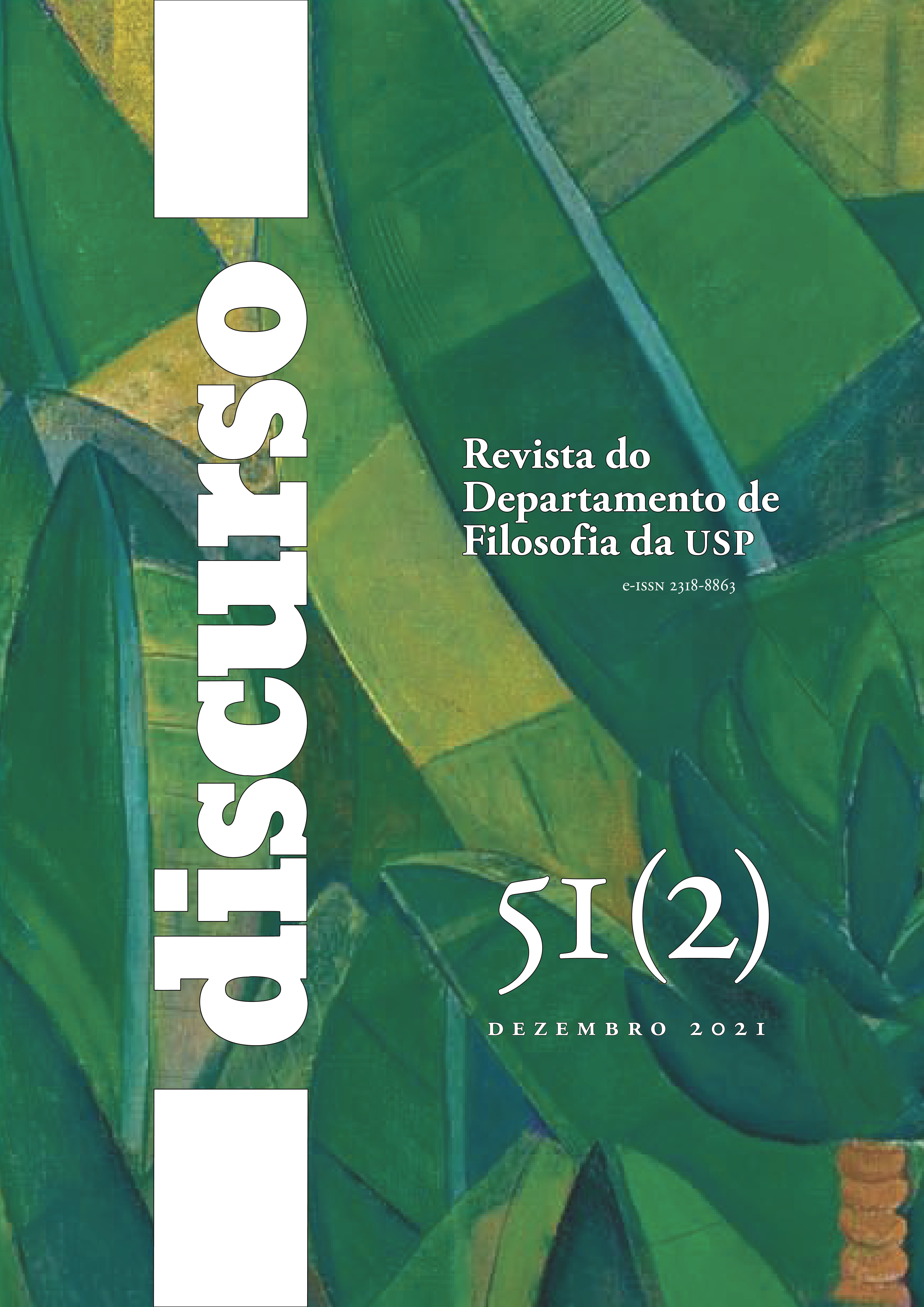Contra o indivíduo: quem se qualifica como “um”?
DOI:
https://doi.org/10.11606/issn.2318-8863.discurso.2021.193762Palavras-chave:
Brown, Foucault, Liberalismo, SoberaniaResumo
O objetivo deste artigo é focalizar especificamente na descrição do homo politicus como um indivíduo soberano que governa a si mesmo. Buscando compreender o neoliberalismo como uma racionalidade governante pela qual tudo se economiza.
Downloads
Referências
Bentham, J. (1988). A Fragment on Government [1776]. Cambridge: Cambridge University Press.
Blackstone, W. (1765). Commentaries on the Laws of En¬gland (Book the First). Oxford: Clarendon Press.
Butler, J. (1997). Excitable Speech. A Politics of the Performative. New York and London: Routledge.
Butler, J. (2004). Precarious Life. Powers of Violence and Mourning. London: Verso.
Butler, J. (2009). Frames of War. When is Life Grievable? London: Verso.
Butler, J. (2015). Notes Toward a Performative Theory of Assembly. Harvard: University Press.
Brown, W. (2015). Undoing the Demos. Neoliberalism’s Stealth Revolution. Zone Books.
Carlyle, T. (1829). “The Signs of Times”, Edinburgh Re¬view. http://www.victorianweb.org/authors/carlyle/signs1.html (last access: 27/03/18).
Dicey, A. V. (2008). Lectures on the Relation betwe¬en Law and Public Opinion in England during the Nineteenth Centu¬ry [1917]. Indianapolis: Liberty Fund.
Feher, M. (2009). “Self-Appreciation; or, The Aspirations of Human Capital”. Public Culture 21(1): 21-41.
Foucault, M. (1997). “What is Critique?”. In: S. Lotringer & L. Hochroch (eds.), The Politics of Truth: Michel Foucault. New York: Semiotext(e), p. 23-82.
Foucault, M. (2002). “The Subject and Power”, in James Faubion (ed.), Power. Essential Works of Michel Foucault 1954-1984. London: Penguin, p. 326-348.
Foucault, M. (2004). Society Must Be Defended. Lectures at the College de France, 1975-76. New York: Picador.
Foucault, M. (2008). The Birth of Biopolitics. Lectures at the College de France, 1978-79. New York: Palgrave.
Gould, S. J. (1981). The Mismeasure of Man. London and New York: W. W. Norton and Company.
Hobbes, T. (1965). Leviathan [1651]. Oxford: Clarendon Press.
Hobsbawm, E. J. (1995). The Age of Capital: 1848-1875. London: Abacus.
Locke, J. (1823). Two Treatises on Government [1690]. London: Thomas Tegg.
Losurdo, D. (2011). Liberalism. A Counter-History. London and New York: Verso.
Lukes, S. (1971). “The Meanings of ‘Individualism’”. Journal of the History of Ideas 32(1): 45-66.
MacPherson, C. B. (1977). The Political Theory of Possessive Individualism: Hobbes to Locke. Oxford: Oxford University Press.
Marshall, T. H. (2009). “Citizenship and Social Class” [1950]. In: Jeff Manza and Michael Sauder (eds.). Inequality and Society. New York: W. W. Norton and Co.
Marx, K. (1992). “On the Jewish Question” [1843]. In: Early Writings. London: Penguin.
Mill, J. (1825). On Government. Supplement to the Encyclopedia Britannica. London: J. Innes.
Mill, J. S. (2001). On Liberty. Kitchener: Batoche Books.
Nauta, L. W. (1984). “Historical Roots of the Concept of Autonomy in Western Philosophy”. PRAXIS International 4: 363-377.
Rudé, G. (1970). Paris and London in the Eighteenth Century. Studies in Popular Protest. London: Collins.
Safatle, V. (2015). O circuito dos afetos. Corpos políticos, desamparo e o fim do indivíduo. Bleo Horizonte: Autêntica.
Safatle, V. (2017). “To be the owner of my own person: toward a concept of freedom as heteronomy without servitude”, unpublished paper.
Zaharijević, A. (2014). Ko je pojedinac? Genealoško propitivanje ideje građanina. Loznica: Karpos.
Downloads
Publicado
Edição
Seção
Licença
Copyright (c) 2021 Adriana Zaharijević

Este trabalho está licenciado sob uma licença Creative Commons Attribution-NonCommercial-ShareAlike 4.0 International License.
O trabalho da Discurso foi licenciado com uma Licença Creative Commons Attribution-NonCommercial-ShareAlike 4.0 International.
Os autores aqui publicados mantém os direitos sobre seus artigos
De acordo com os termos seguintes:
-
Atribuição [BY] — Deve-se dar o crédito apropriado, prover um link para a licença e indicar se mudanças foram feitas.
-
NãoComercial [NC] — É proibido o uso deste material para fins comerciais.
-
CompartilhaIgual [SA] — Caso haja remixagem, transformação ou criação a partir do material, é necessário distribuir as suas contribuições sob a mesma licença que o original.




